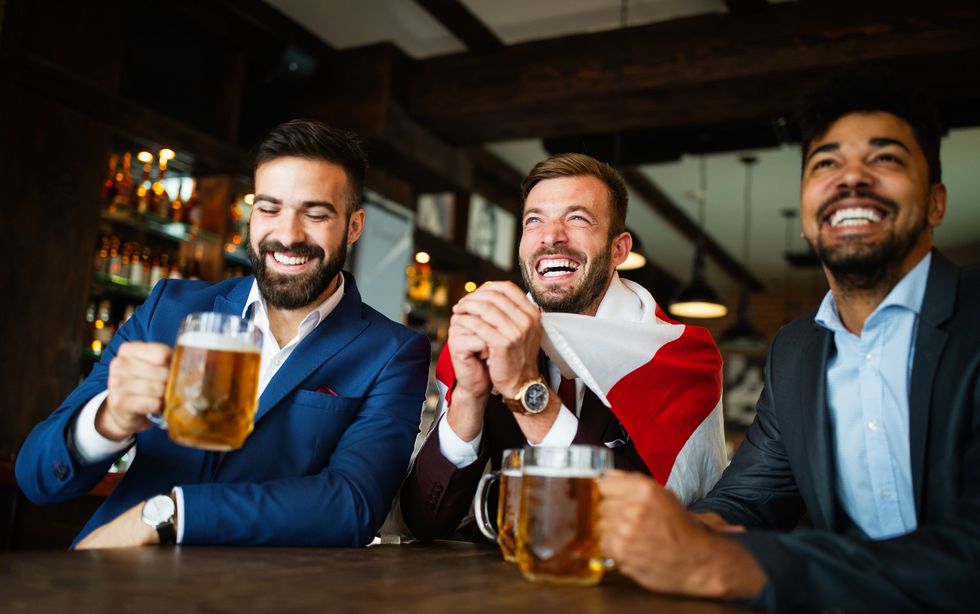Many Brits have been spending more time in the pub with the Euros underway. And no matter the outcome, fans are still reaching for the pints to celebrate or drown their miseries.
Inevitably, the football festivities can lead to a raging hangover with 68 per cent of drinkers confirming they suffer from hangovers following alcohol consumption.
Since the Euros began, searches for handover cures have spiked by a staggering 5,000 per cent.
Luckily, hydration experts at ViDrate have weighed in with invaluable advice on how Brits can nurse and overcome dreaded hangovers the following day.
What are the most common hangover symptoms?
- Headaches
- Fatigues
- Weakness
- Excess thirst
- Irritability
- Anxiety
- Sweating
- Nausea
- Stomach pain
- Increased sensitivity to light and sound
What to avoid when recovering from a hangover?
It may be tempting to try the hair of the dog, but this should be avoided. Drinking again the morning after a night out may temporarily postpone a hangover, but can make it more severe in the long run. Aim to avoid alcohol for at least 48 hours following heavy drinking.
Try to avoid drinking caffeine immediately after waking up - focus on other fluids first. Again, caffeine may temporarily stave off some of the effects of a hangover, including headaches and drowsiness. Caffeine has a diuretic effect, however, and may result in further fluid loss.
Ordering a takeaway may be appealing, but greasy food can further irritate your stomach and exacerbate nausea. It can also increase drowsiness.
Avoid skipping meals. If you feel nauseous, stick to bland foods. If you can, eat fruits and vegetables, as they are a valuable source of electrolytes.
Is there any way to prevent a hangover?
Unfortunately, there is no fail-safe way to avoid hangovers, but there are some ways to reduce their severity. Before you drink, hydrate, and consider using supplements.
Our electrolyte powders, which contain essential minerals such as sodium, magnesium, potassium and calcium, can help you maintain fluid balance as you indulge in alcohol. They also contain added vitamins including B Vitamins, which are water soluble and easily lost when alcohol is consumed.
Make sure to avoid acetaminophen, also known as Tylenol. This can cause liver toxicity when mixed with alcohol and can irritate the lining of the stomach.
Try to vary alcoholic drinks with other fluids. Soda water and green tea are known to boost alcohol metabolism. They can also reduce liver damage.
What are congeners, and are they to blame?
While drinking, try to avoid alcohol high in congeners. Studies show that alcohol with a high concentration of congeners increases the severity of hangovers. Whiskey, cognac and tequila are all high in congeners. Vodka, gin and other colourless alcohol, meanwhile, contain low levels of congeners. Beer is also low in congeners.
Congeners are byproducts, made when alcohol is distilled or fermented. Research on them is fairly limited, but scientists believe them to be at least partly responsible for causing hangovers. Congeners can include acids, esters, alcohols and ketones. Highly distilled alcohols, which are usually more expensive, contain fewer congeners.
Early research suggests that congeners make a hangover linger for longer, as they compete with ethanol for the body’s attention, as it tries to break both compounds down. Congener can also encourage the body to release stress hormones, which leads to an inflammatory response. Inflammatory responses can cause fatigue, headaches and drowsiness.
How long does a hangover last?
According to recent studies, hangovers typically last between 14 and 23 hours.
Some more severe hangovers, however, may last for up to 72 hours. The severity of a hangover depends on the amount of alcohol consumed, the quality of sleep, the quantity of food eaten, and how dehydrated you are.
Existing health conditions and certain medications may also affect the severity of a hangover, as may certain medications. Getting more severe hangovers as you age is not a myth either - as we age, our body becomes slower at processing toxins.
Which electrolytes are best?
Electrolytes such as sodium, magnesium and potassium are well known for being able to remedy headaches, muscle pain and drowsiness. After drinking, replenish electrolytes as soon as possible.
Electrolytes can be consumed in a variety of ways. Spinach, for example, is a fantastic source of calcium and magnesium. If you’re looking for efficiency and convenience, however, electrolyte powders and drinks are best.
How to join the indy100's free WhatsApp channel
Sign up for our free Indy100 weekly newsletter
Have your say in our news democracy. Click the upvote icon at the top of the page to help raise this article through the indy100 rankings.















